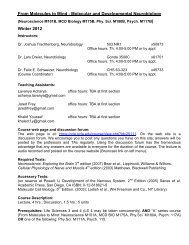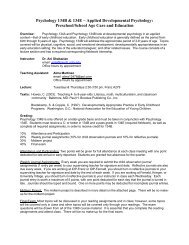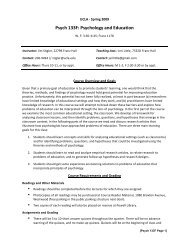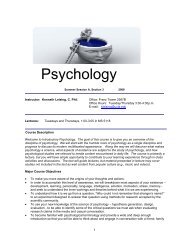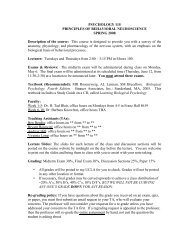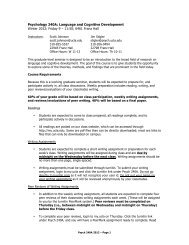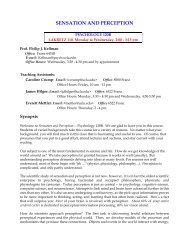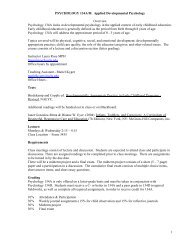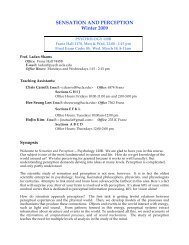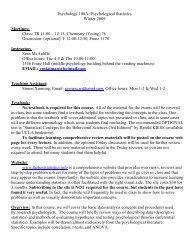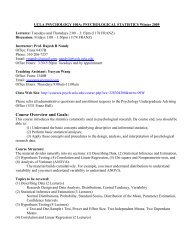Syllabus - Courses in Psychology - UCLA
Syllabus - Courses in Psychology - UCLA
Syllabus - Courses in Psychology - UCLA
You also want an ePaper? Increase the reach of your titles
YUMPU automatically turns print PDFs into web optimized ePapers that Google loves.
Psych 10: Introductory <strong>Psychology</strong><br />
<strong>UCLA</strong> 2012 W<strong>in</strong>ter Section 2<br />
Meet<strong>in</strong>g Time: Tuesdays and Thursdays, 8:00-9:50 am<br />
Room: Moore, Room 100<br />
Class Website: ccle.ucla.edu, log <strong>in</strong> with your Bru<strong>in</strong> ID and Password<br />
Instructor:<br />
Jennifer Shultz, Psy.D.<br />
Email:<br />
JenniferShultz@mednet.ucla.edu<br />
Office hours:<br />
Franz 2555, Thursdays, 12-2pm<br />
Teach<strong>in</strong>g Assistant: Xiaoyang Yang<br />
Office Hours: Franz Hall 2549, Tues. 10-11am<br />
yangxy@ucla.edu<br />
Textbook: <strong>Psychology</strong>, N<strong>in</strong>th Edition <strong>in</strong> Modules by David G. Myers<br />
The textbook is the only read<strong>in</strong>g required for this course. It is absolutely necessary that<br />
you have access to a copy of it as soon as the course starts. It is available at the <strong>UCLA</strong><br />
store and also on 2-hour reserve at Powell Library.<br />
Contact<strong>in</strong>g Me<br />
The quickest and best way to reach me is through e-mail. I encourage you to email me<br />
with concise, specific questions about the material, and if it is dur<strong>in</strong>g the day, I will<br />
usually respond quickly. If you have many questions that will take awhile to discuss,<br />
then please to come to my office hours.<br />
Course Overview and Objectives<br />
This course is designed to give you a primer on the field of psychology.<br />
Psychological science is an extremely broad field that encompasses many diverse areas<br />
of study, <strong>in</strong>clud<strong>in</strong>g (but not limited to) the exam<strong>in</strong>ation of social behavior, development,<br />
learn<strong>in</strong>g, behavior, memory, and mental health. We will discuss not only the factual<br />
knowledge that the field has generated, but also how different types of psychologists<br />
study different aspects of human behavior, rang<strong>in</strong>g from neurons <strong>in</strong> the bra<strong>in</strong> to how<br />
groups and the surround<strong>in</strong>g environment affect <strong>in</strong>dividuals’ social behavior. In the<br />
process, we will touch upon the importance of the scientific method as a tool for mak<strong>in</strong>g<br />
discoveries about human behavior.<br />
After tak<strong>in</strong>g this course, you should be able to:<br />
• Identify some of the prom<strong>in</strong>ent f<strong>in</strong>d<strong>in</strong>gs that have emerged out of the major<br />
subfields of psychology.<br />
• Understand the basic methods employed by psychology’s sub-discipl<strong>in</strong>es.<br />
• Intelligently evaluate research claims that you hear <strong>in</strong> the “real world”.<br />
What I Need From You: I want to make sure you leave this course with a solid grasp<br />
on the fundamental aspects of the major areas of psychology. But I do not want this to
e a mere passive exercise <strong>in</strong> memorization. I want you to engage with the <strong>in</strong>formation<br />
on a deep level. This course will emphasize critical th<strong>in</strong>k<strong>in</strong>g skills and careful<br />
consideration of material. I expect you to participate – ask questions, pose hypotheses,<br />
criticize experimental data, etc.<br />
Assignments and Grad<strong>in</strong>g - Summary<br />
First Midterm Exam – 33.33%<br />
Second Midterm Exam – 33.33%<br />
F<strong>in</strong>al Exam – 33.33%<br />
Research Participation – 0%, but required to pass<br />
Calculation of F<strong>in</strong>al Grades<br />
A+ 97%+<br />
A 93-97%<br />
A- 90-93%<br />
B+ 87-90%<br />
B 83-87%<br />
B- 80-83%<br />
C+ 77-80%<br />
C 73-77%<br />
C- 70-73%<br />
D/F-range below 70%<br />
_______________________________<br />
F<strong>in</strong>al grades will be curved such that 20% of students will receive an A- or better;<br />
30% will receive a grade between B- and B+; 40% will receive a grade between Cand<br />
C+; 10% will receive D+ and lower. Note too that I will not curve your grade<br />
downwards – if half of you get 95% throughout the course, each of you will A’s.<br />
Assignments and Grad<strong>in</strong>g – Details<br />
I. Exams: 33.3% of f<strong>in</strong>al grade<br />
Exams will not be cumulative. That is to say that the first midterm will cover material<br />
presented <strong>in</strong> the first third of the course, the second midterm will cover material <strong>in</strong> the<br />
second third of the course, and the f<strong>in</strong>al will cover material <strong>in</strong> the last third of the<br />
course. All of the material covered s<strong>in</strong>ce the previous exam is fair game, <strong>in</strong>clud<strong>in</strong>g the<br />
read<strong>in</strong>gs that were assigned for the same day you are tak<strong>in</strong>g the exam. Exams will<br />
consist of 50 multiple-choice questions. Be on time to class as exams will start promptly<br />
at the beg<strong>in</strong>n<strong>in</strong>g of class and I will not hand out exams to anyone after the first student<br />
completes their exam. Makeup exams are offered if, and only if, there is a documented
emergency that prevents a student from attend<strong>in</strong>g the usual exam time. Any makeup<br />
exam given will be <strong>in</strong> essay format.<br />
Xiaoyang Yang will be available for review questions on the follow<strong>in</strong>g dates before the<br />
exam: 1/24, 2/21, 3/13. He will be able to answer questions or review material with<br />
students between 11am-12pm <strong>in</strong> his office <strong>in</strong> Franz on those days.<br />
II. Research Participation<br />
You must also participate <strong>in</strong> research studies while enrolled. You must earn a total of 6<br />
research credits (equivalent of 6 total hours) <strong>in</strong> order to pass this course. You may<br />
choose which studies to participate <strong>in</strong>. Anyone who does not fulfill this requirement will<br />
receive an <strong>in</strong>complete for this class. You must register on the follow<strong>in</strong>g website to<br />
participate <strong>in</strong> research: http://ucla.sonasystems.com/. If you have problems with<br />
registration, please contact subjectpool@psych.ucla.edu. All participation must be<br />
completed before March 15th <strong>in</strong> order for you to receive credit. You must assign your<br />
research credits to this course. The alternative is to complete a 2-3 page writ<strong>in</strong>g<br />
assignments, one per unit. Please contact me at the beg<strong>in</strong>n<strong>in</strong>g of the course for the<br />
details of this assignment if you decide to opt out of the research requirement.<br />
Course Policies<br />
Attendance: Although attendance is not directly graded, all of the material mentioned<br />
<strong>in</strong> class (<strong>in</strong>clud<strong>in</strong>g <strong>in</strong>formation presented <strong>in</strong> videos, <strong>in</strong>-class discussions, and formal<br />
lecture) are material that can and likely will be on the exams. This should give you a<br />
strong <strong>in</strong>centive to attend every class.<br />
Read<strong>in</strong>gs: you are responsible for do<strong>in</strong>g the assigned read<strong>in</strong>gs for each lecture before<br />
the lecture. The material <strong>in</strong> these read<strong>in</strong>gs will be on the exams, and read<strong>in</strong>g the<br />
material prior to class will give you a context to better understand the lecture.<br />
A note on academic dishonesty: All work you submit <strong>in</strong> this course must be your<br />
own. If you are caught cheat<strong>in</strong>g, you will receive a zero on the assignment and be<br />
reported to the Dean of Students. Don’t do this. Any <strong>in</strong>stance of academic dishonesty<br />
can have serious consequences and will be handled <strong>in</strong> accordance with <strong>UCLA</strong> guidel<strong>in</strong>es,<br />
which can be found here:<br />
http://www.studentgroups.ucla.edu/dos/assets/documents/StudentGuide.pdf . Do you<br />
know what plagiarism is or how it is def<strong>in</strong>ed? Many students do not, and as a result they<br />
sometimes do not even know when they are plagiariz<strong>in</strong>g. Thus, it is especially important<br />
that you familiarize yourself with this concept.
Week<br />
Day/Date Topic<br />
1 T 01/10<br />
Course Schedule<br />
Course Introduction: History of<br />
<strong>Psychology</strong><br />
R 01/12 History and Research Methods 3<br />
Read<strong>in</strong>g<br />
Modules<br />
2 T 01/17 Biological <strong>Psychology</strong> 4, 5, 6<br />
R 01/19<br />
Sensation and Perception<br />
1, 2<br />
17, 18, 19, 20, 21,<br />
22<br />
3 T 01/24 Learn<strong>in</strong>g and Behavior 23, 24, 25<br />
R 01/26 Memory 26, 27, 28, 29, 30<br />
4 T 01/31 First Midterm Exam<br />
5 T 02/07<br />
R 02/02 Emotions, Stress, and Health 40, 41, 42, 43<br />
R 02/09<br />
Developmental <strong>Psychology</strong>: Prenatal to<br />
Childhood<br />
Developmental <strong>Psychology</strong>: Adolescence<br />
to Adulthood<br />
13, 14<br />
15,16<br />
6 T 02/13 Personality <strong>Psychology</strong> 45, 46, 47<br />
R 02/16 Social <strong>Psychology</strong> 56, 57, 58, 59<br />
7 T 02/21 Evolutionary <strong>Psychology</strong> 11, 12<br />
R 02/23<br />
8 T 02/28<br />
R 03/01<br />
9 T 03/06<br />
10 T 03/13<br />
Second Midterm Exam<br />
Cl<strong>in</strong>ical <strong>Psychology</strong>: Introduction to<br />
Psychological Disorders, Anxiety<br />
Disorders<br />
Cl<strong>in</strong>ical <strong>Psychology</strong>: Dissociative,<br />
Personality, Somatoform Disorders<br />
Cl<strong>in</strong>ical <strong>Psychology</strong>: Mood Disorders and<br />
Schizophrenia<br />
48, 49<br />
50<br />
51, 52<br />
R 03/08 Cl<strong>in</strong>ical Treatment: Therapies 53, 54<br />
R 03/15<br />
Treatment: Biomedical Therapies<br />
Motivation and Work<br />
FINAL EXAM<br />
*complete research participation by this<br />
day to pass the class*<br />
55<br />
36, 37, 38, 39



